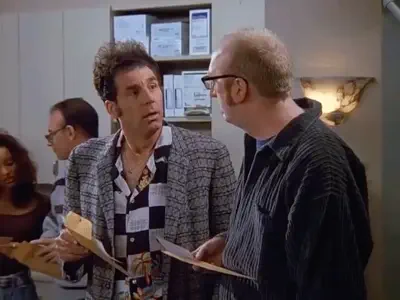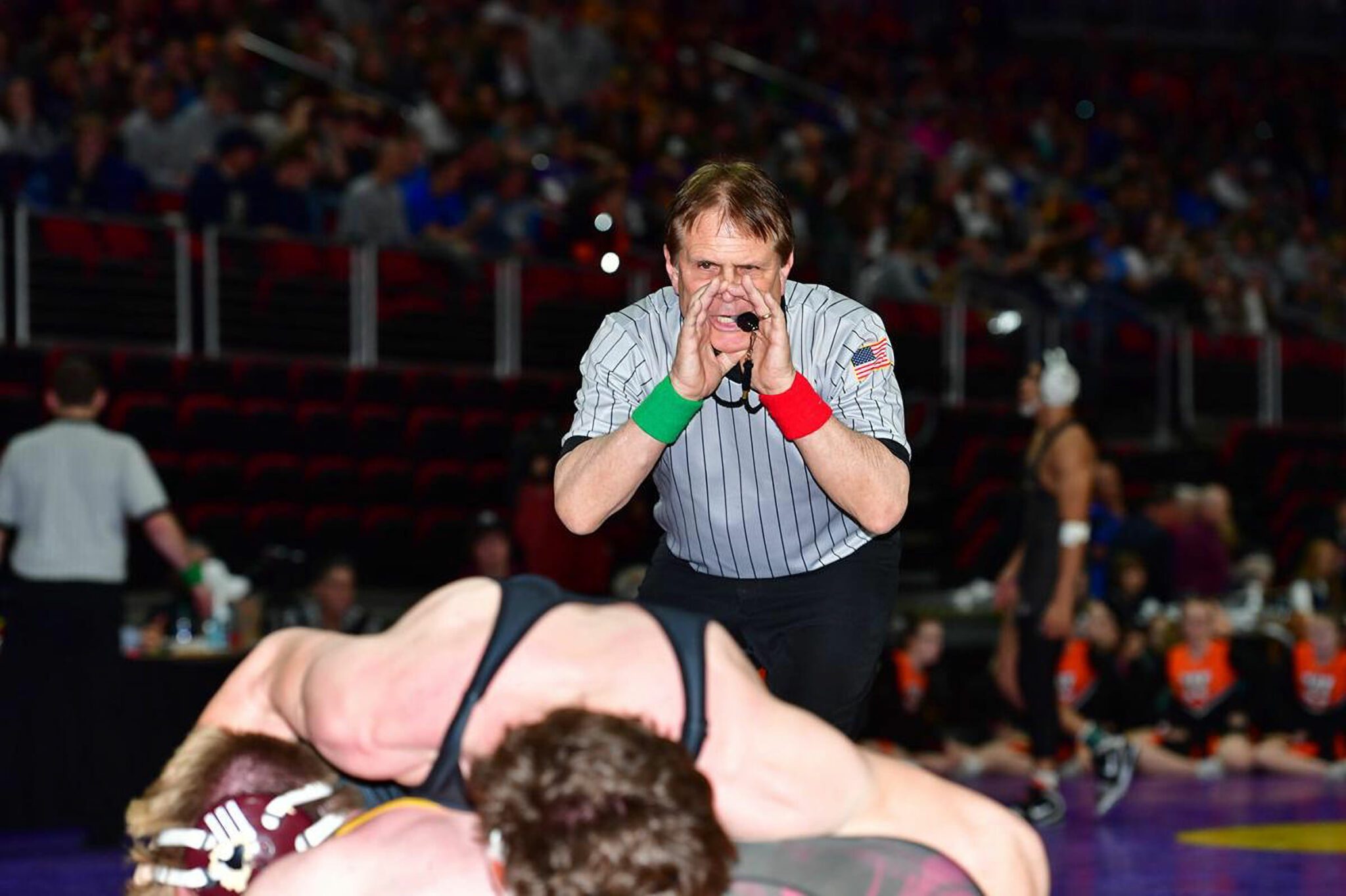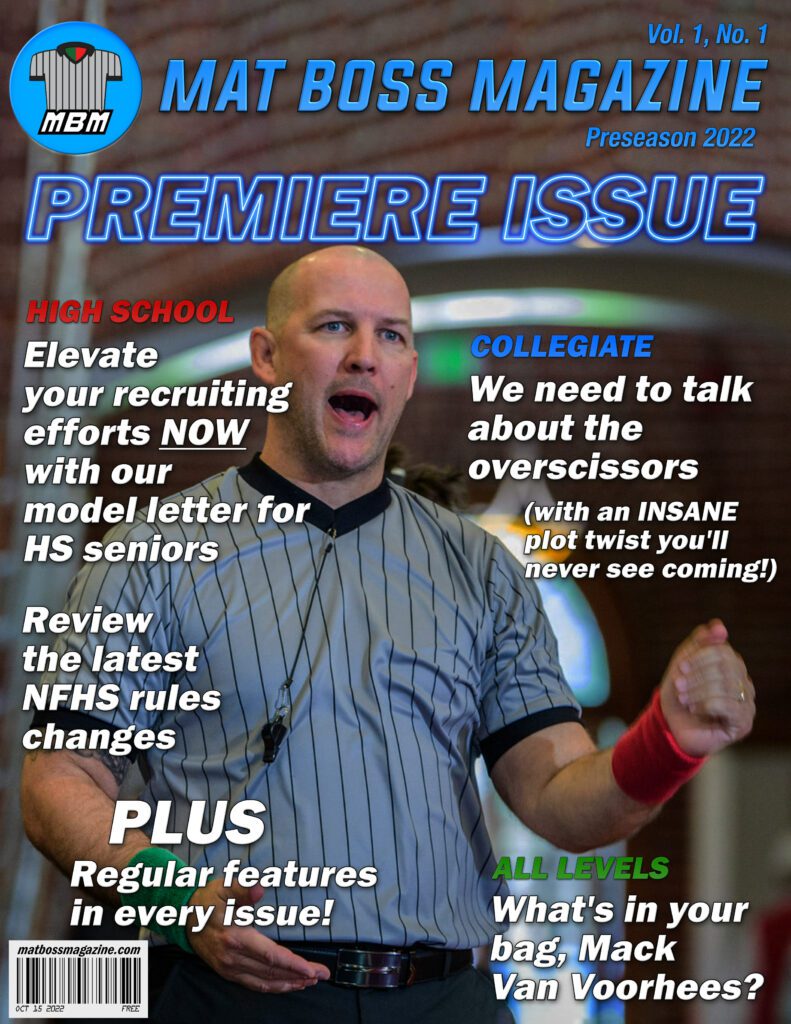Our recruiting efforts suck.
Future articles will get into the many, many, many reasons why this is so, but one key reason they suck as badly as they do is that such efforts are not systematic, regular, and consistent. They are not designed to provide a steady flow of officials into our ranks, and from a young age. And if the officials that are flowing into our ranks does not meet or exceed the number of older officials who are retiring and/or dying, then we have…well, exactly the crisis-level shortage in numbers that we have right now. That is absolutely not sustainable, and it will eventually threaten the continued existence of this sport.
The primary objective of this article is to assist in remedying the aforementioned recruiting problem, which it does by providing you with a model letter that (after replacing the red bracketed text appropriately) you can have emailed, once a year shortly after the wrestling season concludes, to each of the seniors on the various high school wrestling teams within your officiating association’s geographic territory. We are going to focus here on just this one aspect of a complete recruiting framework, because if every officials association only did this once a year and nothing else, they should still see noticeable gains in new membership within a few years’ time (if not immediately).1As we will discuss in a future article, such new membership is only one half of the equation, which needs to be thought of as recruiting and retention. This takes very little work to accomplish, so there really isn’t a valid excuse for not doing it. Anything is better than nothing, and we’ve made it so that you only need to do slightly more than nothing in order to do something — something which could potentially be a very significant contribution.2Nobody ever said the most important recruiting tasks also had to be difficult to accomplish! The problem is that they are simply not being done, at all, by anyone. As ultimately easy as this task is to accomplish, the letter doesn’t send itself! Someone in each association must take personal responsibility for doing this.
We don’t have to go from “zero to perfect” overnight when it comes to building a sustainable and systematic recruiting framework. But we do need to improve our recruiting efforts — on an expedited timeline — and we do have to start that process somewhere. It might as well be here. The worst that can happen is that it achieves literally nothing for recruitment — which is, for most wrestling officials and officials associations, merely the status quo.
The Strategy: Focus on the Money
This strategy seeks to emphasize the money officials can make. If your area’s wrestling official pay isn’t where it needs to be, this will prevent you from getting new officials no matter what you do. “Where it needs to be” means, at the time this article is being published, at least $25 per hour, though preferably $30 per hour.3This absolutely needs to be raised from time to time, in order to offset inflation, cost of living increases, etc. I do not care where in the United States you are located, it is absolutely critical that your officiating association make this happen, and it must become the standard minimum expectation throughout the nation for the high school level and below.
The strategy we are pursuing here entails presenting wrestling officiating as more attractive (financially and otherwise) than, say, the standard minimum wage job folding clothes at Target. And even those minimum wage jobs are generally paying $15 per hour now, so if you are not offering the kind of significantly higher hourly rate mentioned above, all we can say is…

Why This Is Such a Critical Recruiting Opportunity
A major purpose of this letter is to “plant the seed” with our audience, because once they go out into the world, we can’t really track them anymore. We can perhaps reconnect with them after college if they wrestled there,4Stay tuned for The Postseason Letter to College Seniors, next in our Recruiting Focus series. but for most of them, this is the last time we will ever have an opportunity to communicate with such a perfectly-tailored audience like this (i.e., every single person receiving the letter is a wrestler who is, absent unusual circumstances, going to be eligible to officiate the very next season). If we miss this opportunity to plant the seed now, we are making a significant mistake because we do not get another chance to reliably reach any significant portion of this audience. Even if they aren’t going to officiate immediately, we still want them to at least understand that wrestling officiating is a “lifetime opportunity” they will always have available to them because of their high school wrestling experience. It is a source of income that they can count on in good times and bad, as long as we still have a sport to officiate.
What Are Our Numbers Like Currently?
Number of Registered Folkstyle Wrestling Officials by State
METHODOLOGY
We requested this figure directly from each state’s interscholastic athletic agency. We received responses both in writing and by phone, in most cases very quickly. We did hit a couple of snags — specifically, California and Hawaii.
The Hawaii High School Athletic Assocation simply failed to respond to our multiple requests. We will attempt to request the information again from time to time, and if they ever do take a break from the beach long enough to get back to us with a number, we will update the map accordingly. In the meantime, we simply made an executive decision to go with a totally rough guess of 30 officials. We are confident that, insofar as this figure is off of the actual number, such a difference is negligible and will not materially impact the nationwide total.
California’s situation is…just so California. Unlike at least 48 of its sister states, the California Interscholastic Federation actually does not know how many registered wrestling officials it has in the state.
Yes, you read that correctly. They don’t have it, and they don’t attempt to find out. In fact, to find out the number, we would have to contact the head official in each of the ten or so “sections” that California has for wrestling.
No thank you; we’re not doing that. Instead, we will estimate California’s number at 500 (which we believe to plausibly be within 100 of the actual number) until the California Interscholastic Federation gets a clue. We will be sure to update the map accordingly when this happens.
Map Notes
-
1
When combining these individual state numbers, totals may include "double counting" of officials who are registered in more than one state.
-
2
Many collegiate officials also officiate high school, so the collegiate number (which is 392) may include a significant number of officials who have already been counted by this map.
-
3
Total officials: 8807 + 392 collegiate officials = 9199. This is not an accurate total, however, because the aforementioned duplication (meaning (1) duplication of high school officials who are registered in multiple states, and (2) duplication of collegiate officials who are also registered as high school officials in one or more states) must still be subtracted in order to arrive at a proper total. We have not yet offered any estimates of what a reasonable mathematical correction should be in this regard.
-
4
Ohio leads the states with 761 officials, which is significantly more than any other state (Pennsylvania, which comes in second, has 570, nearly 200 fewer). We will be discussing Ohio's comparative success in this regard, including possible reason(s) for that success, in a future issue.
Our Model Letter to High School Seniors
Dear Wrestlers:
My name is [Mack Van Voorhees]; I am a wrestling official and a member of the [Western Unitus Wrestling Officials Association]. I am writing to you because your high school is located within our Association’s geographic area. The purpose of this email is to inform you about a job option that will be available to you starting in the near future — and which will continue to be available to you for many years to come.
Now that your high school wrestling career has come to an end, you likely fit into one of three groups:
(1) You will be wrestling (or competing in another sport) at the collegiate level;
(2) You will be leaving [western Unitus] to attend college, but do not plan to compete in collegiate athletics; or
(3) You will be staying in [western Unitus] (whether or not you plan to attend college), and you do not plan to compete in collegiate athletics.
If you are planning to wrestle or compete in another sport at the collegiate level, you aren’t really going to have sufficient free time to officiate. However, it is definitely something to keep in mind for after you’re finished with collegiate athletics, so please read on.
If you are not competing in collegiate athletics, but are planning to attend college outside of [western Unitus], I encourage you to consider becoming a wrestling official in that area. I am more than happy to provide you with whatever information you need to get certified (whether in [Unitus] or in another state), and to connect you with officials in that area that can mentor you and help you obtain assignments. Much of what I say in this letter will still be relevant to you regardless of where you will be attending college, so please read on.
If you will be staying in [western Unitus] (regardless of whether or not you plan to attend college), and you do not plan to compete in collegiate athletics, I want to encourage you to consider joining our ranks as a [Unitus] wrestling official once you have graduated high school.
WHY SHOULD YOU BECOME A WRESTLING OFFICIAL?
BECAUSE $$$, THAT’S WHY.
In case you were unaware, here in [western Unitus], wrestling officials (at every level of competition) make a minimum of [$30 per hour].
Now, I’ll be blunt: There is no other job you can get at your age that will pay you anything remotely close to [$30 per hour]. (Indeed, even after college, you might not be able to obtain a job that will pay you this kind of money.)
And it’s part-time, in the sense that you can work as much or as little as you want. Obviously, most youth wrestling events are held on the weekends (Saturdays and Sundays), and we simply do not have enough wrestling officials right now to cover all of the youth events taking place across our area. If you want to work, and you take the work seriously, you will have absolutely no problem obtaining plenty of assignments. But you don’t have to accept any assignment if you don’t want to work a certain day, or a certain weekend. It‘s completely up to you. (Though I think you’ll find that you won’t want to be passing up this kind of money very often.)
Did I mention, by the way, that you always get paid at the end of the event you worked? And did I mention that you’re typically paid in cash? (If you don’t understand why that’s a very good thing, ask your parents and they’ll tell you.)
Plus, you get to be around a sport that you love, doing something that‘s a lot of fun. I know that for me, the hours fly right by. I really, really enjoy officiating this sport.
But not just anyone can officiate our sport. To do it well, it requires an understanding of the sport that one gains through actual wrestling experience. Fortunately, all of you already possess this special knowledge — obtained through your years of blood and sweat on the mats — that makes you able to understand the rules deeply enough to be able to apply them competently. As you know, much of our sport does not involve “black-and-white” judgments (like whether a ball bounced in or out, or whether a runner was out or safe), but rather, frequently requires “gray area” judgment calls — such as whether a wrestler obtained or lost control, or whether a wrestler was stalling. For this reason, our sport is more difficult to officiate than many others, but that is also what makes it so much fun to officiate.
Now, I’m sure you’re aware that as an official, you’ll sometimes have coaches, parents, and/or spectators that are…well, let’s just say “less than polite.” It’s no secret that this discourages some people from choosing to become officials, as they don’t think they can deal with that kind of pressure, confrontation, and/or stress. I’d like to take a moment to assuage those concerns.
First of all, and most importantly: As an official, you will always have the final say. Always. Someone may not agree with your call, but they still have to abide by it. You don’t have to argue with anyone, ever — nor should you. The mat is your domain, and it isn’t a democracy. Of course, you’ll certainly want to be able to explain the basis for a call (if, for example, a coach requests a conference at the table), and you may even wish to consider the coach’s position on the matter, but you need not let this turn into a debate. Once again, the final say is always yours.
Second, as an official, you will never be able to please all of the people all of the time. In fact, you can generally expect that whenever you make a call, 50% of the people interested in the match will be happy with the call, and the other 50% will not be happy with the call. The faster you internalize this, the faster you’ll learn to “tune out” all the static and stay focused on calling what you see, which is all that matters.
Finally, dealing with coaches, parents, and spectators is a bit of an art and a science, and it often takes some time to learn how to do it well. Here in the [Western Unitus Wrestling Officials Association], we are extremely committed to mentoring new officials. We will teach you everything you need to know to become highly skilled in every aspect of officiating, including how to handle even the most unruly coaches, parents, and spectators with professionalism and grace. As a member of the [Western Unitus Wrestling Officials Association], you can officiate with confidence that we will always — always — have your back.
If you are interested in becoming a wrestling official, or if you have any questions about this subject whatsoever, please do not hesitate to get in touch with me at anytime. (My contact information is below.) Thank you very much for your time and attention, and I hope to hear from you!
Very truly yours,
[Mack Van Voorhees
Wrestling Official
Western Unitus Wrestling Officials Association
Contact information (this should include, at a minimum, your cell phone and e-mail)]
Notes on the Letter
The letter is a bit on the longer side. However, perhaps we should consider it a bit of a test, in that we do want people who have an attention span of more than three seconds. In fact we probably want people who have attention spans of at least, say, one minute, as that is the minimum length of a period in a match they will be officiating. Also, they will need to read the rulebook and casebook closely — which, while not that long, are each still about a hundred times longer than the letter.
The specific steps involved in properly sending this letter are as follows:
Step 1: Copy and paste the text of the letter into a new email in the email editor of your choice. Make sure it is formatted properly and there are no typographical or other errors caused by the copying/pasting. Pay attention to the details. “Anything worth doing is worth doing well” is one of those pleasant-sounding adages that may not always be true, but it is absolutely true here.
Step 2: Replace the bracketed text with text applicable to you.5Obviously, it should no longer be colored red; that was solely to assist you in drafting your copy of the letter. Save the completed email as a draft; we will return to it shortly.
Step 3: Find out the email addresses of the head coaches of each high school wrestling team in your area, as well as the athletic directors of each of those high schools.6The administration of each high school should be able to provide you with this information if you cannot locate it through the usual means (e.g., the school district’s website). You will be requesting that they forward the email along to each of the seniors on their teams (if they had any seniors this season).
Step 4: Promptly after the season has concluded (within two weeks, if possible), take the draft email you saved in Step 2, address it to each of the coaches and athletic directors from Step 3, and politely request, at the top of the email, that they forward your message along via email to each of their school’s senior wrestlers. Important: Send this email only after the wrestling season has officially concluded in your respective state.



